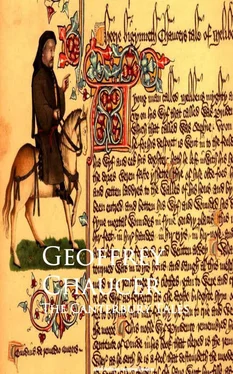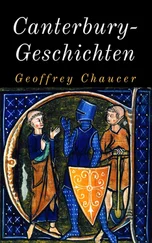Somnour.
A Somnour was ther with us in that place,
That hadde a fyr-reed cherubinnes face,
625
For sawcefleem he was, with eyen narwe.
As hoot he was, and lecherous, as a sparwe;
With scalled browes blake, and piled berd;
(630)
Of his visage children were aferd.
Ther nas quik-silver, litarge, ne brimstoon,
630
Boras, ceruce, ne oille of tartre noon,
Ne oynement that wolde dense and byte,
That him mighte helpen of his whelkes whyte,
Nor of the knobbes sittinge on his chekes.
Wel loved he garleek, oynons, and eek lekes,
635
And for to drinken strong wyn, reed as blood.
Thanne wolde he speke, and crye as he were wood.
And whan that he wel dronken hadde the wyn,
(640)
Than wolde he speke no word but Latyn.
A fewe termes hadde he, two or three,
640
That he had lerned out of som decree;
No wonder is, he herde it al the day;
And eek ye knowen wel, how that a Iay
Can clepen 'Watte,' as well as can the pope.
But who-so coude in other thing him grope,
645
Thanne hadde he spent al his philosophye;
Ay ' Questio quid iuris ' wolde he crye.
He was a gentil harlot and a kinde;
(650)
A bettre felawe sholde men noght finde.
He wolde suffre, for a quart of wyn,
650
A good felawe to have his concubyn
[20: T. 653-687.]
A twelf-month, and excuse him atte fulle:
Ful prively a finch eek coude he pulle.
And if he fond o-wher a good felawe,
He wolde techen him to have non awe,
655
In swich cas, of the erchedeknes curs,
But-if a mannes soule were in his purs;
For in his purs he sholde y-punisshed be.
(660)
'Purs is the erchedeknes helle,' seyde he.
But wel I woot he lyed right in dede;
660
Of cursing oghte ech gilty man him drede—
For curs wol slee, right as assoilling saveth—
And also war him of a significavit .
In daunger hadde he at his owne gyse
The yonge girles of the diocyse,
665
And knew hir counseil, and was al hir reed.
A gerland hadde he set up-on his heed,
As greet as it were for an ale-stake;
(670)
A bokeler hadde he maad him of a cake.
623. Cm. Pt. Somnour; Hl. sompnour; E. Hn. Somonour. 627. E. Hn. Cm. scaled. 629. Cp. Pt. Hl. bremston. 632. E. the; rest his. 652. E. Ln. Hl. And; rest Ful. 655. Cm. Cp. erche-; E. erce-; Hl. arche-. 660. Cp. Ln. him; Hl. Pt. to; rest om. 661. Hl. Pt. saueth; E. sauith. 663. Hl. owne; E. owene. 668. E. bokeleer.
Pardoner.
With him ther rood a gentil Pardoner
670
Of Rouncival, his freend and his compeer,
That streight was comen fro the court of Rome.
Ful loude he song, 'Com hider, love, to me.'
This somnour bar to him a stif burdoun,
Was never trompe of half so greet a soun.
675
This pardoner hadde heer as yelow as wex,
But smothe it heng, as dooth a strike of flex;
By ounces henge his lokkes that he hadde,
(680)
And ther-with he his shuldres overspradde;
But thinne it lay, by colpons oon and oon;
680
But hood, for Iolitee, ne wered he noon,
For it was trussed up in his walet.
Him thoughte, he rood al of the newe Iet;
Dischevele, save his cappe, he rood al bare.
Swiche glaringe eyen hadde he as an hare.
685
A vernicle hadde he sowed on his cappe.
[21: T. 688-722.]
His walet lay biforn him in his lappe,
Bret-ful of pardoun come from Rome al hoot.
(690)
A voys he hadde as smal as hath a goot.
No berd hadde he, ne never sholde have,
690
As smothe it was as it were late y-shave;
I trowe he were a gelding or a mare.
But of his craft, fro Berwik into Ware,
Ne was ther swich another pardoner.
For in his male he hadde a pilwe-beer,
695
Which that, he seyde, was our lady veyl:
He seyde, he hadde a gobet of the seyl
That sëynt Peter hadde, whan that he wente
(700)
Up-on the see, til Iesu Crist him hente.
He hadde a croys of latoun, ful of stones,
700
And in a glas he hadde pigges bones.
But with thise relikes, whan that he fond
A povre person dwelling up-on lond,
Up-on a day he gat him more moneye
Than that the person gat in monthes tweye.
705
And thus, with feyned flaterye and Iapes,
He made the person and the peple his apes.
But trewely to tellen, atte laste,
(710)
He was in chirche a noble ecclesiaste.
Wel coude he rede a lessoun or a storie,
710
But alderbest he song an offertorie;
For wel he wiste, whan that song was songe,
He moste preche, and wel affyle his tonge,
To winne silver, as he ful wel coude;
Therefore he song so meriely and loude.
669. E. was; rest rood, rode. 670. E. Cm. Pt. Rounciuale. 672. E. soong. 676. E. heeng. 677, 678. E. hise. 680. But] Cm. Hl. And. Hl. ne; rest omit . 683. E. Discheuelee. 685. Hl. Cp. on; rest vp on. 686. Hl. lay; which the rest omit. 687. Hl. Cm. come; rest comen. 688. Hl. eny ( for hath a). 690. Hn. yshaue; E. shaue. 695. All oure. 713. Hl. right ( for ful). 714. Cp. Pt. Ln. so meriely; E. Hn. Cm. the murierly.
715
Now have I told you shortly, in a clause,
Thestat, tharray, the nombre, and eek the cause
Why that assembled was this companye
(720)
In Southwerk, at this gentil hostelrye,
That highte the Tabard, faste by the Belle.
720
But now is tyme to yow for to telle
[22: T. 723-758.]
How that we baren us that ilke night,
Whan we were in that hostelrye alight.
And after wol I telle of our viage,
And al the remenaunt of our pilgrimage.
725
But first I pray yow, of your curteisye,
That ye narette it nat my vileinye,
Thogh that I pleynly speke in this matere,
(730)
To telle yow hir wordes and hir chere;
Ne thogh I speke hir wordes properly.
730
For this ye knowen al-so wel as I,
Who-so shal telle a tale after a man,
He moot reherce, as ny as ever he can,
Everich a word, if it be in his charge,
Al speke he never so rudeliche and large;
735
Or elles he moot telle his tale untrewe,
Or feyne thing, or finde wordes newe.
He may nat spare, al-thogh he were his brother;
(740)
He moot as wel seye o word as another.
Crist spak him-self ful brode in holy writ,
740
And wel ye woot, no vileinye is it.
Eek Plato seith, who-so that can him rede,
The wordes mote be cosin to the dede.
Also I prey yow to foryeve it me,
Al have I nat set folk in hir degree
745
Here in this tale, as that they sholde stonde;
My wit is short, ye may wel understonde.
715. E. Hl. shortly; rest soothly. 716. Hl. Thestat; Hn. Thestaat; E. The staat; Cm. Cp. The estat. 718. E. as; rest at. 724. E. oure ( but our in l. 723). 725. E. youre; Hl. ȝour. 726. E. Hn. Cm. narette; Cp. Pt. Hl. ne rette. 734. E. or; Hl. ne; rest and. 741. All but Hl. om. that.
Greet chere made our hoste us everichon,
(750)
And to the soper sette he us anon;
And served us with vitaille at the beste.
750
Strong was the wyn, and wel to drinke us leste.
A semely man our hoste was with-alle
For to han been a marshal in an halle;
A large man he was with eyen stepe,
A fairer burgeys is ther noon in Chepe:
755
Bold of his speche, and wys, and wel y-taught,
And of manhod him lakkede right naught.
[23: T. 759-793.]
Читать дальше












